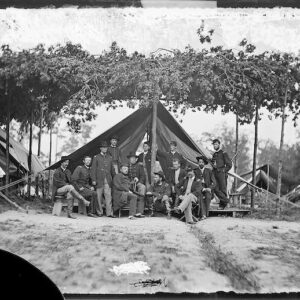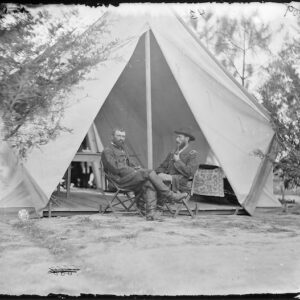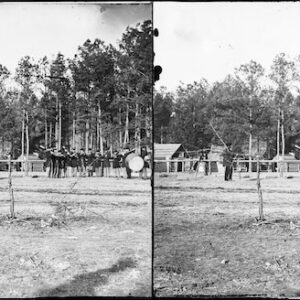Tag: Weitzel (Godfrey)
 Wikipedia says: Godfrey (Gottfried) Weitzel (November 1, 1835 – March 19, 1884) was a German-American major general in the Union army during the American Civil War. He was the acting Mayor of New Orleans during the Union occupation of the city and also captured and occupied the Confederate capitol, Richmond, Virginia. Weitzel also is known for his post-war accomplishments with the U.S. Army Corps of Engineers in designing and constructing internal improvements, particularly along the Ohio River and the Great Lakes region.
Wikipedia says: Godfrey (Gottfried) Weitzel (November 1, 1835 – March 19, 1884) was a German-American major general in the Union army during the American Civil War. He was the acting Mayor of New Orleans during the Union occupation of the city and also captured and occupied the Confederate capitol, Richmond, Virginia. Weitzel also is known for his post-war accomplishments with the U.S. Army Corps of Engineers in designing and constructing internal improvements, particularly along the Ohio River and the Great Lakes region.
…When the American Civil War began, Weitzel was assigned to construct defenses, including in Cincinnati and Washington, as well as for George McClellan in the Army of the Potomac in late 1861. He was then attached to the staff of Major General Benjamin F. Butler as chief engineer of the Department of the Gulf. When Union troops captured New Orleans, Weitzel became assistant military commander and acting mayor. He was promoted to brigadier general in August 1862 and two months later routed a large force of the enemy at Labadieville, Louisiana, which earned him a brevet promotion to major in the Regular Army. Weitzel commanded a brigade in the XIX Corps advancing in Major General Nathaniel P. Banks’s operations in western Louisiana during April and May 1863, which led to the siege of Port Hudson. Weitzel was later brevetted lieutenant colonel in the Regular Army, “for gallant and meritorious services at the siege of Port Hudson,” which fell on July 9, 1863, days after Vicksburg, Mississippi, about 120 miles upriver, the last Confederate stronghold on the great Mississippi, had fallen. Together those successful sieges and the continuing blockage of Southern ports completed the Anaconda Plan.
Beginning in May through September 1864, Weitzel was assigned as chief engineer of the Army of the James, still under General Benjamin F. Butler, which was targeting the Confederate capitol, as well as its naval defenses under the remnants of the James River Squadron. He was engaged in May at Swift’s Creek and the actions near Drury’s Bluff and the Bermuda Hundred Campaign (against his former commander, now Confederate General P.G.T. Beauregard), and the Deep Bottom in August. By month’s end, Weitzel was brevetted major general of volunteers “for meritorious and distinguished services during the civil war.”
General Weitzel assumed command of the XVIII Corps from September 1864 through the end of the year, and was brevetted colonel in the regular army for the capture of Fort Harrison (renamed Fort Burnham for the Union commander dying in the assault) on September 29.
On November 7, 1864, Weitzel became a major general of volunteers and on December 3 was assigned command of the XXV Corps, consisting of U.S. Colored Troops under white officers. As the year ended, he participated in the unsuccessful First Battle of Fort Fisher, guarding Wilmington, North Carolina, the last major Confederate port. He and his corps were reassigned to Virginia two weeks later, when General Butler was relieved of duty in favor of General Alfred H. Terry, who captured the port on January 15.
During the war’s final months, Ulysses S. Grant named Weitzel to command all Union troops north of the Appomattox River during the final operations against Robert E. Lee’s Army of Northern Virginia. Speaking to his men on February 20, 1865, Weitzel told them:
Let history record that on the banks of the James 30,000 freemen not only gained their own liberty, but shattered the prejudice of the world, and gave to the land of their birth peace, union and glory.
After the fall of Petersburg, Confederate forces considered their capitol, Richmond, indefensible. They evacuated, and set fire to and its military and tobacco storehouses during their retreat the night of April 2, which blaze spread to surrounding residential and commercial buildings. The city’s mayor, Joseph Mayo traveled out along the Osborn Turnpike to Tree Hill Farm to find a Union commander to whom to surrender the city that night, and ask for help quelling the blaze. He found Majors Atherton H. Stevens Jr. and Eugene E. Graves who took his note to Major General Weitzel, who rode in to Richmond’s city hall and accepted the formal surrender document at 8:15 that morning. Thus Weitzel took possession of Richmond, on April 3, 1865, and his Union forces extinguished the fires.
Weitzel soon established his headquarters in the home of Jefferson Davis. His aide, Lieutenant Johnston de Peyster, is credited with raising the first U.S. flag over the city after its capture by the Union. The next day, President Abraham Lincoln visited the Confederacy’s capital. Weitzel served as Lincoln’s confidential aide and bodyguard during two days of peace negotiations with Confederate representatives. After Lincoln’s assassination days later, Secretary of War Edwin M. Stanton refused to believe the generous terms on which Lincoln would have allowed Virginia to rejoin the Union.
In histories of Masons’ Hall in Richmond, it has been noted that Weitzel protected Masons’ Hall from burning and looting in the time period immediate after the Confederate’s retreat from Richmond. Weitzel, who was a Freemason, was requested by old Masons of the city to protect the Hall, and Weitzel granted their request and had sentinels posted so that no harm was done to it.
In 1866, after the war’s end, Weitzel reflected on the service of African American soldiers in the Union Army, stating:
Its organization was an experiment which has proven a perfect success. The conduct of its soldiers has been such to draw praise from persons most prejudiced against color, and there is no record which should give the colored race more pride than that left by the 25th Army Corps.
Showing all 3 results


